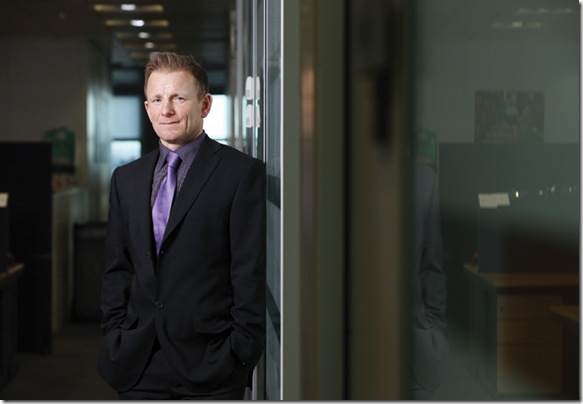Driving real change
BT’s Peter Russell tells Owen McQuade why keeping customers at the core is central to the company’s public sector business as fiscal pressures on clients increase. ICT, he contends, is more than a commodity and can bring real change in service delivery.
Keeping customers at the core of business is essential for BT, Peter Russell has firmly concluded after three and half months with the organisation. As Head of Public Sector, Russell’s role covers BT’s business in criminal justice, education, health and central and local government. He heads up a team of 16, which then draws on a virtual team of specialists elsewhere in the business.
Coming to the job after roles in Microsoft and Steria, his first priority was to understand the organisation, coming as it was from a public sector culture. The change under way within the company had, though, impressed him – both as he prepared to join the organisation and in his time there so far.
“One of the biggest things that I have been encouraged about over the last six months has been the level of change within BT especially in terms of the really pro-active efforts placing the customer at the core of everything we do,” he comments.
“Our number one priority is to deliver excellent customer service. Obviously, we want to grow the business and we want to do this profitably but if we focus everything on our customer and maintaining our market share during the very difficult transition that the public sector is going through, then I think we’ll come out of it as a stronger business.”
Year for change?
The entire local public sector is braced for cuts, regardless of who wins the next general election, with Northern Ireland due to take a greater hit due to its dependence on funding from Westminster. Russell’s own conversations with clients confirm that view and he is convinced that ICT can help them transform, whilst also making efficiences and reducing costs.
“Inevitably, all of our customers in the public sector are now looking at reducing costs, so right across education, justice, government and health, our customers are now looking to do the same things for less,” he remarks.
“So everything is being scrutinised. They’re closely reviewing and challenging all their respective business processes and services saying: ‘Here’s the traditional way we do things and we need to do things differently’, or ‘We need to reduce our existing costs.’”
This can, of course, be achieved in different ways. Some clients are looking at the costs for managed services, when they find that more expensive systems or very high services levels are no longer needed. Others look at software and ask whether they should renew their annual agreements on the same level or for a lower price.
BT is keen to help customers to save money now and therefore maintain its market share.
“Right now, our customers are under massive cost pressures which will continue and probably become even more compelling, and we need to be able to help our customers with that,” he says. “So we need to look at where our customers traditionally have spent money in terms of voice, lines, calls – anything that they do with BT and with other suppliers – and look at ways of actually reducing those costs.
“The opportunity out of that then will become the credibility that our customers see us as a changing organisation, that we’re more flexible and agile than we were ever before, that we’ve actually helped them with their immediate shortterm issues.”
Restructuring in health, education and local government has already resulted in consolidation, where organisations which previously used multiple suppliers are starting to look at a single, cost-effective and efficient one instead.
“There’s definitely an opportunity for BT, because of the breadth of our business in NI and that fact that we are a global organisation. And that’s not getting back into the old monopoly discussion again. It is a genuine ability,” Russell points out. Indeed, in Scotland, BT manages and hosts the calls, lines and voice services for much of the country’s health service.
Innovation
On the question of whether Northern Ireland business has forgotten to innovate, he does say that it is sometimes difficult for organisations to find the vision for innovation to take place. A lot of innovation, he notes, has already taken place such as the introduction of shared services in the Civil Service and at the Land and Property Services Agency, where BT has helped to run programmes to reduce outstanding rates bills.
Russell explains: “Traditionally, with those major shared services contracts, you have to go through a period of pain and a period of what people would perceive as little benefit to the organisation and NI plc. You’re going to have to go through change, you’re going to have to do things differently, you’re going to have to train people, you’re going to have to change many traditional business processes.
“The benefits then really happen once you’ve gone through that initial transition period. I believe the public sector in NI, in terms of the shared services, has that opportunity now because they’ve gone through, with all due respect, a lot of change and a lot of pain with many shared service implementations.
In a related case study, BT’s PFI contract for Liverpool Direct, the benefits were seen only after years five, six and seven of the project.
Northern Ireland’s small size means that running shared services should make sense beyond the core Civil Service. And given the current state of public finances, there is a need for reviewing progress very differently than was done before, with a real focus on delivering benefits to the citizen.
“I think there are some terrific people in the public sector and great leadership in there so I think it can happen. You need a compelling event maybe to trigger these things off and we have it, and it’s going to come very soon,” namely the postelection comprehensive spending review.
Priorities
Asked what he would hope to achieve between now and this time next year, he returns to his initial key themes.
“Number one, that our customers in the public sector see us as having implemented change in our own organisation and that we are definitely more flexible and adaptable and more relevant to their challenges than ever before,” Russell emphasises. “If we always go back to ‘everything anchored in our customers’ and ‘everything we do is focused on our customers’, we’ll be going in the right direction.”
Maintaining market share comes a close second: “We’d like to make sure that we maintain the customer base that we have at the moment. We have a very strong customer base and we would obviously aspire to secure some of the big contracts that are coming up in health, and education.”
He continues: “An equally top priority is our people. I want to make sure that our people are happy and motivated and enjoy their work. They spend a lot of time here, more so than ever before, and I want to make sure that our team come into work with a smile.” If everyone enjoys
what they do, the company has much more chance of being successful in delivering its core objectives.
Despite how ICT’s importance has increased over the last 15 to 20 years, he still senses that many people do not really understand the full value of how ICT can transform business.
“I still see, even now, a reluctance – and it’s not just public sector, it’s private sector as well – of really believing that ICT can transform their organisation. So I think many of our CIOs [chief information officers] right across the public sector and private sector have a real challenge on their hands.”
Generally, ICT budgets take up a small share of overall organisational spending, 2 to 3 per cent being a norm, but this also makes them vulnerable in cost-cutting exercises. ICT is therefore often seen as a “cost centre” commodity which can be, in the event of budgetary pressures switched off.
Suppliers, partners and customers need to convince chief executives and finance officers that ICT can actually transform organisations and deliver significant benefits. In summary, we should be saying “rather than cut only 2 per cent, let’s look at how IT can deliver cost optimisation benefits to the much greater 98 per cent of overall spending.”
That 98 per cent share is where the real difference can be made but unfortunately, as yet, Northern Ireland does not have really shining case studies of where this has actually happened
“Nobody has really demonstrated that that a particular project has delivered significant savings and because of that the public sector purse is saving x million pounds per annum,” Russell says. “I think those things need to happen, otherwise people are going to be less convinced and are going to go back to traditional thinking. Rather than looking at innovation or different ways of transforming a business, to restructure, they will continue to look at short term options. IT organisations, he adds, need to get into the board room to substantiate their business case. Unified communications is a good example to promote. For example, in the Northern Bank, tele-presence technology means that staff can communicate by videoconferencing, thus avoiding travel costs. Their initial investment was paid back in travel savings within 12 months.”
Next generation
In early December, Enterprise Minister Arlene Foster announced an investment of £48 million in the province’s telecoms infrastructure through the Next Generation Broadband project. This involved introducing new technology to increase broadband speeds over the next 18 months. BT is investing around £30 million in the project.
Russell welcomes the move as a “positive” one and admits that he previously did not realise how much BT put back into Northern Ireland. There is “nearly an expectation” that BT will invest, given its local presence and large work force.
BT’s commitment to improve customer service was shown by the appointment of a Customer Services Director on the Ireland leadership team, whose job is to resolve problems as quickly as possible. This, he concludes, is already bringing visible benefits to customers, which is very encouraging indeed.
Profile: Peter Russell
In another guise, Peter Russell is better known for his rugby career, playing for Instonians, Ulster and Ireland. His Irish career took him through four tough games in 1990-1992: New Zealand twice, England and Australia “and we lost all four.”
Peter Russell joined the Northern Bank aged 20 after a year at Queen’s University. He later graduated with a first and went on to work for the bank for 17 years. Managing data centres for its owner, the National Australia Bank, took him across to work Glasgow, which he recalls as a “massive step”.
He sees himself as a project manager, never a sales person. Returning to the province, he was Steria’s regional manager for seven and a half years and was then approached by Microsoft to lead its public sector work, initially in Northern Ireland and then island-wide.
Married with three daughters, his other interests outside work are golf and rugby. “I try at all costs to stay away from shopping,” he quips.






